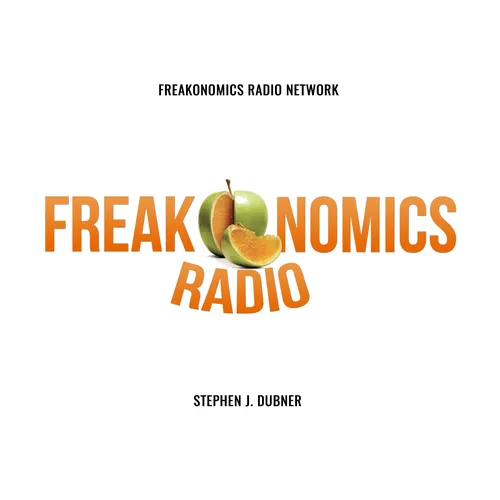
Freakonomics Radio
Freakonomics co-author Stephen J. Dubner uncovers the hidden side of everything. Why is it safer to fly in an airplane than drive a car? How do we decide whom to marry? Why is the media so full of bad news? Also: things you never knew you wanted to know about wolves, bananas, pollution, search engines, and the quirks of human behavior.
To get every show in the Freakonomics Radio Network without ads and a monthly bonus episode of Freakonomics Radio, start a free trial for SiriusXM Podcasts+ on Apple Podcasts or by visiting siriusxm.com/podcastsplus.
- Update frequency
- every 5 days
- Average duration
- 41 minutes
- Episodes
- 857
- Years Active
- 2010 - 2025

The Economics of Sports Gambling (Ep. 388 Rebroadcast)
What happens when tens of millions of fantasy-sports players are suddenly able to bet real money on real games? We’re about to find out. A recent Supreme Court decision has cleared the way to bring a…

429. Is Economic Growth the Wrong Goal?
The endless pursuit of G.D.P., argues the economist Kate Raworth, shortchanges too many people and also trashes the planet. Economic theory, she says, “needs to be rewritten” — and Raworth has tried,…

How the Supermarket Helped America Win the Cold War (Ep. 386 Rebroadcast)
Aisle upon aisle of fresh produce, cheap meat, and sugary cereal — a delicious embodiment of free-market capitalism, right? Not quite. The supermarket was in fact the endpoint of the U.S. government’…

428. The Simple Economics of Saving the Amazon Rain Forest
Everyone agrees that massive deforestation is an environmental disaster. But most of the standard solutions — scolding the Brazilians, invoking universal morality — ignore the one solution that might…

427. The Pros and Cons of Reparations
Most Americans agree that racial discrimination has been, and remains, a big problem. But that is where the agreement ends.

426. Should America (and FIFA) Pay Reparations?
The racial wealth gap in the U.S. is massive. We explore the causes, consequences, and potential solutions. Also: another story of discrimination and economic disparity, this one perpetrated by an in…

425. Remembrance of Economic Crises Past
Christina Romer was a top White House economist during the Great Recession. As a researcher, she specializes in the Great Depression. She tells us what those disasters can (and can’t) teach us about …

424. How to Make Your Own Luck
Before she decided to become a poker pro, Maria Konnikova didn’t know how many cards are in a deck. But she did have a Ph.D. in psychology, a brilliant coach, and a burning desire to know whether lif…

423. The Doctor Will Zoom You Now
Thanks to the pandemic, the telehealth revolution we’ve been promised for decades has finally arrived. Will it stick? Will it cut costs — and improve outcomes? We ring up two doctors and, of course, …

422. Introducing "No Stupid Questions"
In this new addition to the Freakonomics Radio Network, co-hosts Stephen Dubner and Angela Duckworth discuss the relationship between age and happiness. Also: does all creativity come from pain? New …

421. How to Prevent Another Great Depression
Millions and millions are out of work, with some jobs never coming back. We speak with four economists — and one former presidential candidate — about the best policy options and the lessons (good an…

420. Which Jobs Will Come Back, and When?
Covid-19 is the biggest job killer in a century. As the lockdown eases, what does re-employment look like? Who will be first and who last? Which sectors will surge and which will disappear? Welcome t…

How to Make Meetings Less Terrible (Ep. 389 Rebroadcast)
In the U.S. alone, we hold 55 million meetings a day. Most of them are woefully unproductive, and tyrannize our offices. The revolution begins now — with better agendas, smaller invite lists, and an …

419. 68 Ways to Be Better at Life
The accidental futurist Kevin Kelly on why enthusiasm beats intelligence, how to really listen, and why the solution to bad technology is more technology.

418. What Will College Look Like in the Fall (and Beyond)?
Three university presidents try to answer our listeners’ questions. The result? Not much pomp and a whole lot of circumstance.

417. Reasons to Be Cheerful
Humans have a built-in “negativity bias,” which means we give bad news much more power than good. Would the Covid-19 crisis be an opportune time to reverse this tendency?

416. How Do You Reopen a Country?
We speak with a governor, a former C.D.C. director, a pandemic forecaster, a hard-charging pharmacist, and a pair of economists — who say it’s all about the incentives. (Pandemillions, anyone?)

415. How Rahm Emanuel Would Run the World
As a former top adviser to presidents Clinton and Obama, he believes in the power of the federal government. But as former mayor of Chicago, he says that cities are where real problems get solved — e…

414. Will Covid-19 Spark a Cold War (or Worse) With China?
The U.S. spent the past few decades waiting for China to act like the global citizen it said it wanted to be. The waiting may be over.

413. Who Gets the Ventilator?
Should a nurse or doctor who gets sick treating Covid-19 patients have priority access to a potentially life-saving healthcare device? Americans aren’t used to rationing in medicine, but it’s time to…